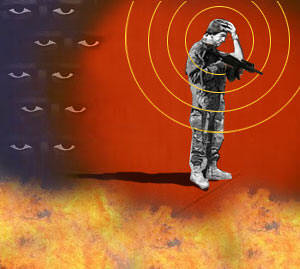This Forum took place on December 6th, six days before the House held a Public Hearing on Military Suicides at which Ilona Meagher, of PTSD Combat: Winning the War Within testified.
Well, as promised in another post, there is more to pass on about the Fort Drum – Watertown NY PTSD Forum which you will find below.

The Forum took place at the:
Differant Drummer Cafe – Watertown New York
Our cafe is designed to provide active duty and reserve military personnel and families at Ft. Drum with an inviting, comfortable, and warm place to socialize, listen to music and enjoy other live entertainment. Soldiers will also have access to legal counselling, a bookstore, and a regular program of film showings and discussions on current issues.
And hosting the Forum were:
*Dean Anthony, MSW and Trauma Therapist
*Joe Gregory, Mexico, N Y, father of an Iraq combat vet who was killed after returning home because the VA failed to treat his PTSD.
*Marty Webster, VVAW Natl. Coordinator, and a Vietnam vet who still suffers from PTSD.
*Tod Ensign, attorney for Sgt Brad Gaskins, arrested by Ft Drum police as he sought to return to Ft Drum for mental health care. A two tour Iraq combat vet, Gaskins went AWOL when he was refused treatment for his PTSD.
There is now a Video, a Must See, from the Forum on the Tompkins County & Ithaca Against the War web site put together and provided by Cris McConkey
View the Video
The video shows the four hosts, listed above, giving their opening statements. I haven’t tried to contact Cris yet so don’t know if a further video will be coming, do know he was one of two camera’s filming the forum.

Here is some further coverage
News 10 Now television coverage.
Soldier calls PTSD an “ugly demon” by Amy Ohler
Another report of the event in the National Weekly, “Socialist Worker”
Supporting veterans’ rights
Also check out this article that also is running in the current issue of Socialist Worker
The story of the GI coffeehouses
North Country Public Radio also did a four day Series: Post-traumatic Stress Disorder at Fort Drum
PTSD at Drum, pt.1: What the military does 12/11/07
Last month, 3500 soldiers returned to Fort Drum from a 15-month tour in Iraq. According to Army studies, a quarter of them, or almost one thousand men and women, will bring home mental problems associated with post-traumatic stress disorder. Their depression, anxiety, sleeplessness, and substance abuse, if not properly treated, can deeply scar themselves, their families, and the communities they live in. But study after study finds the military’s mental health system in disarray: a backlog of PTSD-related claims, a shortage of licensed psychologists, a need for an overhaul of the entire system. Today we begin a 4-part series on post-traumatic stress disorder at Fort Drum. We’ll hear from soldiers who feel they’ve been neglected, and we’ll visit a café in Watertown that provides them refuge. But first, David Sommerstein reports on how Fort Drum identifies and treats soldiers for combat-related mental illness.
PTSD at Ft. Drum, pt.2: A soldier speaks out 12/12/07
If you hear one complaint from soldiers about how the Army handles post-traumatic stress disorder, it’s about a bureaucracy that doesn’t seem to care. The military officially recognized PTSD as a medical illness almost 30 years ago. Yet soldiers still complain of not getting the help they need. Mountains of paperwork, a backlog of claims, a shortage of licensed psychologists, and a dearth of scientific research all get in the way. In part two of our series on treating PTSD at Fort Drum, David Sommerstein has the story of one soldier who says Fort Drum’s mental health system failed him again and again.
CORRECTION TO ORIGINAL STORY: This story first reported that the military requires three letters from commanders documenting that a soldier was in a traumatic combat situation. A Fort Drum spokesman e-mailed to say that one letter is required. The audio has been changed accordingly.
PTSD at Ft. Drum, pt.3: A cafe for dissent 12/13/07
Since the war in Iraq began, the U.S. military has come under increasing fire for a mental health system that even top officials acknowledge needs a complete overhaul. Soldiers fighting combat trauma go untreated. Trained psychologists are in short supply. Funding for research into post-traumatic stress disorder is inadequate. Across the country, a growing number of soldiers are taking matters into their own hands. They’re compiling lists of resources for people who need help. And they’re organizing their own group therapy sessions. In part three of our series on PTSD, a café in Watertown has become a refuge for soldiers who are breaking rank and seeking help on their own. David Sommerstein reports.
PTSD, Pt.4: A war trauma counselor 12/14/07
This week we’ve been reporting on the struggles of Iraq and Afghanistan veterans in getting help with combat trauma. Today we get a window inside their world from one of the North Country’s most respected experts. Nellie Coakley is a Vietnam veteran. She relies on her own experience in her work as a war trauma counselor. She’s worked out the region’s Vet Center since the 1980s. Vet Centers were created to give an alternative to Vietnam vets who didn’t trust the standard VA channels. Coakley counsels an increasing number of Iraq and Afghanistan vets, and she sees a similar mistrust. She says the American public needs to do more to understand post-traumatic stress disorder and help veterans re-enter society. The trouble is, soldiers coming home with PTSD find they can’t leave their warrior training behind. For them, Coakley told David Sommerstein, combat is life-changing.
North Country Public Radio comes to you from: St. Lawrence University, Canton, New York 13617-1475


2 comments
we’ll incorporate this into the vets/civilans project.